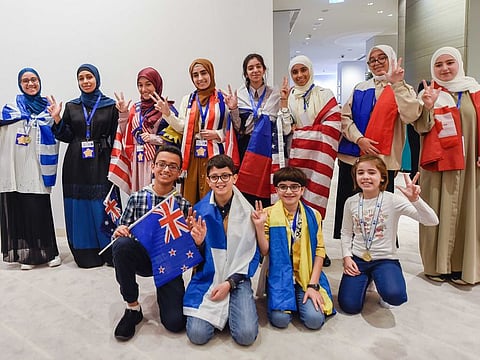Displaced children fight odds to learn Arabic
Reading Challenge winners from countries where Arabic is not taught reveal challenges

Dubai: Many of their families have been displaced from war-torn Arab countries. Some of them come from countries that do not offer formal education in Arabic.
The children from 22 countries, who are semi-finalists in the category of students from non-Arab countries in the Arab Reading Challenge, have fought many odds to reach this level in the largest literacy contest in their mother tongue.
As their skills in Arabic were being tested for the final round yesterday, some of the semi-finalists who spoke to Gulf News said they needed to learn their mother tongue as it is a dominant aspect of their identity and one of the few things that remain with displaced families.
‘We need to protect our language at all costs’
Haya Mohammad, 12, from the US, whose parents hail from Iraq and Jordan, said that many Arab countries are facing turmoil. “I feel our language is one of the only things we have been left with and we need to protect it at all costs.”
She is worried that the Arabic language could disappear if people forget it. If she wins the first prize in the grand finale, she said it will send a strong message in the US about how knowledgeable and smart Arabs are.
The grade eight student, who wishes to study medicine and also be a translator in Arabic, hoped that her skills in Arabic would help her bridge gaps between communities.
She said she would donate at least 10 per cent of the cash prize [to those in distress] if she became the champion in her category.
The first three winners among the students from non-Arab countries stand to win Dh100,000, Dh70,000 and Dh30,000 at the grand finale at Dubai Opera today.
‘My father teaches me’
It was not the prize money but the participation that mattered the most to Mohammed Amara from Norway, where there is no formal education system for Arabic. His father is from Tunisia and his mother is from Syria.
“My father teaches me and my sister Arabic. I also go to a weekly class offered by volunteers in a mosque. And I read the Quran too. That helps a lot,” said the 16-year-old.
Amin Amro, who teaches Arabic as a volunteer at the mosque where Amara goes, has accompanied the three country winners from Norway as there are no school supervisors to accompany them, unlike in the case of children from other countries.
“There are no facilities for formal education in Arabic,” said Amro. “The immigrant society is relatively small [in size] compared to the [numbers in] the UK and US,” he said.
Amro hailed the Arab Reading Challenge for encouraging children from his country to keep learning their mother tongue and hoped that their participation would inspire many more to learn Arabic, thereby prompting the government to allow formal education in Arabic.
Inspired by sister who won third prize last year
Maria Almajeed from Australia, 16, who primarily learnt Arabic by reading the Quran, said she had to depend on online books since she was not able to obtain good books in Arabic in her country.
Hailing from a Palestinian family, who migrated from Iraq to Australia in 2003, Almajeed found it difficult to learn English in the initial years.
She was bullied by her schoolmates who called her names. Yet, she said, she worked hard to study well and proved them wrong by scoring high marks.
Eventually, she said, she began to wonder whether she was going to forget her mother tongue in which the Quran is written.
“I decided that I will never let that happen and I decided to continue learning Arabic.”
She was inspired to take part in the Arab Reading Challenge by her sister who had become the third prize winner in this category last year. A total of 50,000 participants took part in the year-long reading challenge from non-Arab countries.

